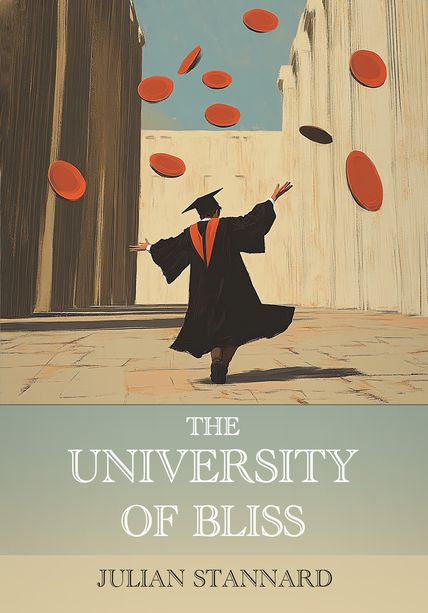
British universities once enjoyed an enviable reputation. Then the political class introduced fees, and in came corporate fixers, accountants, branding experts, those who salivate before the market. Hardnosed managers cut posts and salaries: why not put those bumbling professors on zero-hour contracts and get them to do a vast amount of unpaid work?
Now in 2035 at the University of Bliss in the south of England, the dead hand of bureaucracy smothers all intellectual endeavour. An unashamedly corporate ideology holds sway, thinly veiled by ubiquitous rainbow washing and tokenistic gestures towards moral and spiritual values, the environment, and mental wellbeing. Cue for poets Tristan Black and Harry Blink and charming if duplicitous post-structuralist Humph Lacan to fight back. But is it too late to save the university?
The University of Bliss is a spoof, a satire, a cri de coeur—Evelyn Waugh on acid. And of course, any similarity to actual persons, living, dead, or merely soulless, is purely coincidental.
Notices
“Julian Stannard lampoons the pompous managerialism of university life with wry wit and mischievous topspin. This is a knockout satire of a dystopian present, and an inmate’s revenge, a last laugh.”
—Rónán Hession, author of Ghost Mountain
“The University of Bliss is stunningly funny. Its witty, acerbic humour places it in a class well beyond the campus novels of the twentieth century. This is no revisitation of the 1960s; it is a revitalization in the terms of 2035, where gender non binary education is branded for sale to the socially disadvantaged. The familiar university hierarchy, vice-chancellor, dean, professor, is all there, but this is supplemented by a brilliant cast of consumer grotesques worthy of Charles Dickens each one of whom is struggling to make money out of their paying customers—the students. The characterisation is sharply observed and convincingly recorded; the narrative is mordant in such a way that image and idea tumble together in a vortex of comic misassociation. University life is infused with the ideas and dogmas of commercial speculation. A few brave souls rebel but are sent for rehabilitation. The brilliant and energetic surface of the novel floats bouyantly on the progressive depletion of academic integrity. The darkness is there but it never extinguishes the human vitality and the comic exuberance of this novel.”
—Roma Tearne, author of TRACe: The Museum of Memory
“Fearless, feisty and laugh-out-loud funny, The University of Bliss conjures a dystopia that may be with us sooner than we think. This is a must-read for anyone who’s ever studied or worked at a university, or is even thinking about it. In two words: hilariously brilliant.”
—J.W. Wood, author of Captcha This!
“The University of Bliss decries the shambolic, slapstick shitshow that is higher education with ludicrous delight. Stannard writes with a delicious cynicism that is as poetic as it is unapologetic, offering an inside glance at a system wrenched from the realm of public good by free enterprise, which preys on diversity, gorges on free thinking and wraps a bureaucratic straight jacket around its academics, who are squeezed until barely alive.”
—Harry Gallon, Every Fox is a Rabid Fox
“[Stannard delivers] a devastating evisceration … The University of Bliss belies its title. This is a work of high satire and Stannard vents his frustration with more than a touch of Swiftian saeva indignatio. His ridicule is extreme and addictively readable.”
—Brian Martin, in The Spectator
“With many acid observations on how our hallowed halls of learning have plummeted into grimy halls of profit, and of how college deans have been persuaded to ‘fumble in the greasy till’ of questionable sponsorship and patronage, this funny, futuristic satire is one that’s not so much 2035 as 2025.”
—Anne Cunningham, in the Westmeath Independent
“This is not just a book for those working in humanities in HEIs across the UK, this doesn’t just speak to that handful of Creative Writing academics who get asked ‘Yes, but what are you employability statisitics like?’ It is for anyone who values education, who values culture, who considers the world their children or grandchildren are going to inherit in terms of learning, philosophy, literature and art. It is a highly readable novel, biting, funny and fast paced, but at the same time, do take a pause every now and then to consider the world Stannard is creating—how close do you think we’re getting to that now?”
—Kim Wiltshire, in Everybody’s Reviewing
“The University of Bliss is a scathing satire of British higher education set in a dystopian near future. [Stannard’s grim comedy] is barely hyperbole…. The world that Stannard depicts is already here…. [A] ferociously funny condemnation of university commercialization and the tyranny of rankings, student satisfaction scores and bureaucracy run amok.”
—W.J. Davies, in Times Literary Supplement
“Julian Stannard’s novel combines SF and satire. But the story it tells happily wanders off into Rabelaisian humour, fireworks of vocabulary and exuberant nonsense. Here William Burroughs meets C.P. Snow. Stannard is a poet, and his novel is the sort of book the reader can open anywhere and enjoy the lighting switches from one sentence to the next, the elusive allusive phrases…. The narrative is a clothesline hung with flimsy characters, often shat-upon by their robot hybrid pets, and it glories in its adjectival and acronymic subject clusters—breaking most of the rules about adjectives churned out so thoughtlessly by writing workshops. But the novel does not neglect drama…. Well worth a read, Brave New World for academia, if you like.”
—Anthony Howell, in The Fortnightly Review
“An over-the-top dystopian satire set in 2035 Britain. The narrative follows the arrival of the newly appointed vice chancellor Gladys Nirvana, whose very large salary is based on her expertise in “pure reflectivity”…. The Department of Wellbeing ensures that demoralised academics must stroke an increasingly depressed dog…. will undoubtedly resonate in academia.”
—Colin Steele, in Canberra City News
